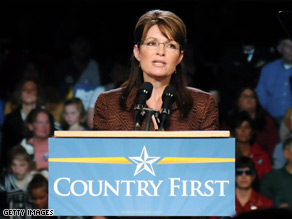
 by Lisa Van Dusen/10.26.08
by Lisa Van Dusen/10.26.08On the evening of last Jan. 26 at the Columbia, S.C., Convention Center, something happened in the middle of Barack Obama's victory speech.
Obama had beaten Hillary Clinton 55%-27% in that day's primary, results that were seen at least in part as a referendum on the issue of race, especially among whites, a quarter of whom voted for Obama.
"We have the most votes the most delegates and the most diverse coalition of Americans that we've seen in a long, long time," Obama said.
From the bleachers behind him, a new chant erupted.
"Race doesn't matter! Race doesn't matter!"
It was an admonishment to the other side and a dare to the rest of the country.
In the past two weeks, the rest of the country seems to have responded. Obama is now at least ten points ahead in most polls. More crucially, especially for the question of whether America was ready for a black president, 48 percent now say they have confidence in Obama serving as commander in chief, statistically even with McCain's 50 percent, and seven out of 10 now say race won't be a factor in their vote.
Those numbers have shifted in the past six weeks, as Obama has passed every leadership test McCain has failed, from his choice of running mate to his handling of the economy to his daily campaign decisions (at a certain point, momentum becomes its own leadership indicator).
After months of uncertainty about whether there was a ceiling beyond which racial attitudes would limit his support, the issue has been clarified by both voters' economic concerns and Obama's obvious strengths.
Obama is now leading in states such as Indiana and Virginia that have not voted for a Democratic presidential candidate since Lyndon Johnson's landslide against Barry Goldwater in 1964, when the demographic divisions over his newly passed Civil Rights Act hadn't yet gelled and the nation was still mourning president Kennedy.
ACCOMPLISHMENT
No matter what happens in the next nine days, the success of their 50-state strategy is an accomplishment that not just Obama but his Chicago strategists won't have to tell their grandchildren about because they'll learn it in civics class.
What they may also learn is that, in this election, the path from voter intention to ballot to official result was especially daunting.
The 2000 Florida recounts exposed more about the sausage-making details of democracy than just chads and hanging chads, it revealed the extent to which voter suppression had become the new black art of political warfare and it's only grown more sophisticated since then.
Since Congress passed the misleadingly named Help America Vote Act in 2002, partisan election officials have purged, according to the U.S. Election Assistance Commission, more than 2.7 million voters from the rolls. In 2004, more than 1.6 million votes were never counted.
Environmental lawyer and Democratic activist Robert F. Kennedy Jr., whose birthright must give him an acute appreciation for the lengths to which people will go to subvert democracy, founded the website NoVoterLeftBehind.net partly to substantiate to the conventional wisdom that the law disproportionately impacts Democratic voters.
"HAVA has been used to erect a series of barriers," Kennedy told MSNBC last week, "that make it really an obstacle course, particularly for African Americans to vote, for Hispanics to vote, for young people and old people."
The new registration requirements, in the finest tradition of racially and politically skewed motor voter laws, use prohibitively stringent ID requirements, including driver's licence requirements and "perfect match" rules that require every fact on all your government IDs to match when you register to vote.
BRADLEY EFFECT
Most years, a huge gap between pre-vote polling, exit poll results and official tallies would raise questions. But because of the speculation about the Bradley effect, whereby the black mayor of Los Angeles lost his bid for the California governorship 26 years ago after polls showed him ahead, the outcome some people envision when they say "narrow victory scenario" holds more than a faint hope.
When voters have cited issues other than race in their intention not to vote for Obama and the ones who do see race as an issue haven't been shy about it, a real Bradley effect would require an awful lot of backpedalling by an awful lot of people.
And covering suppression by selling a decades-old fable that race does matter to voters who've already said it doesn't would make what happened in Florida eight years ago look like a day at the beach.






















